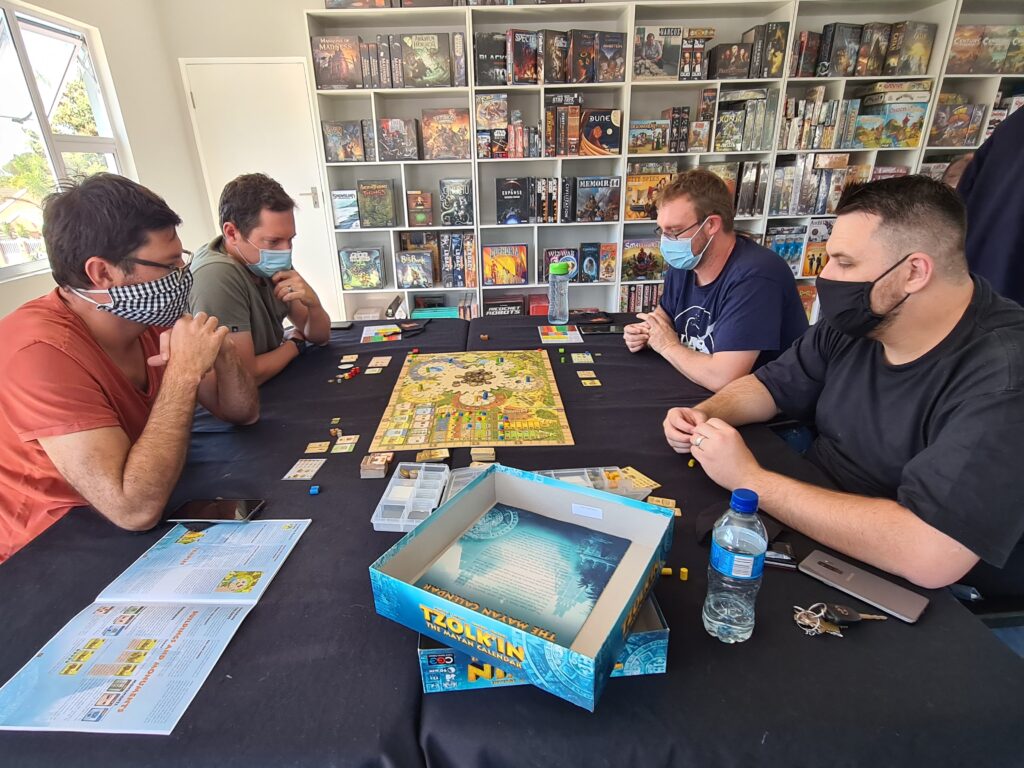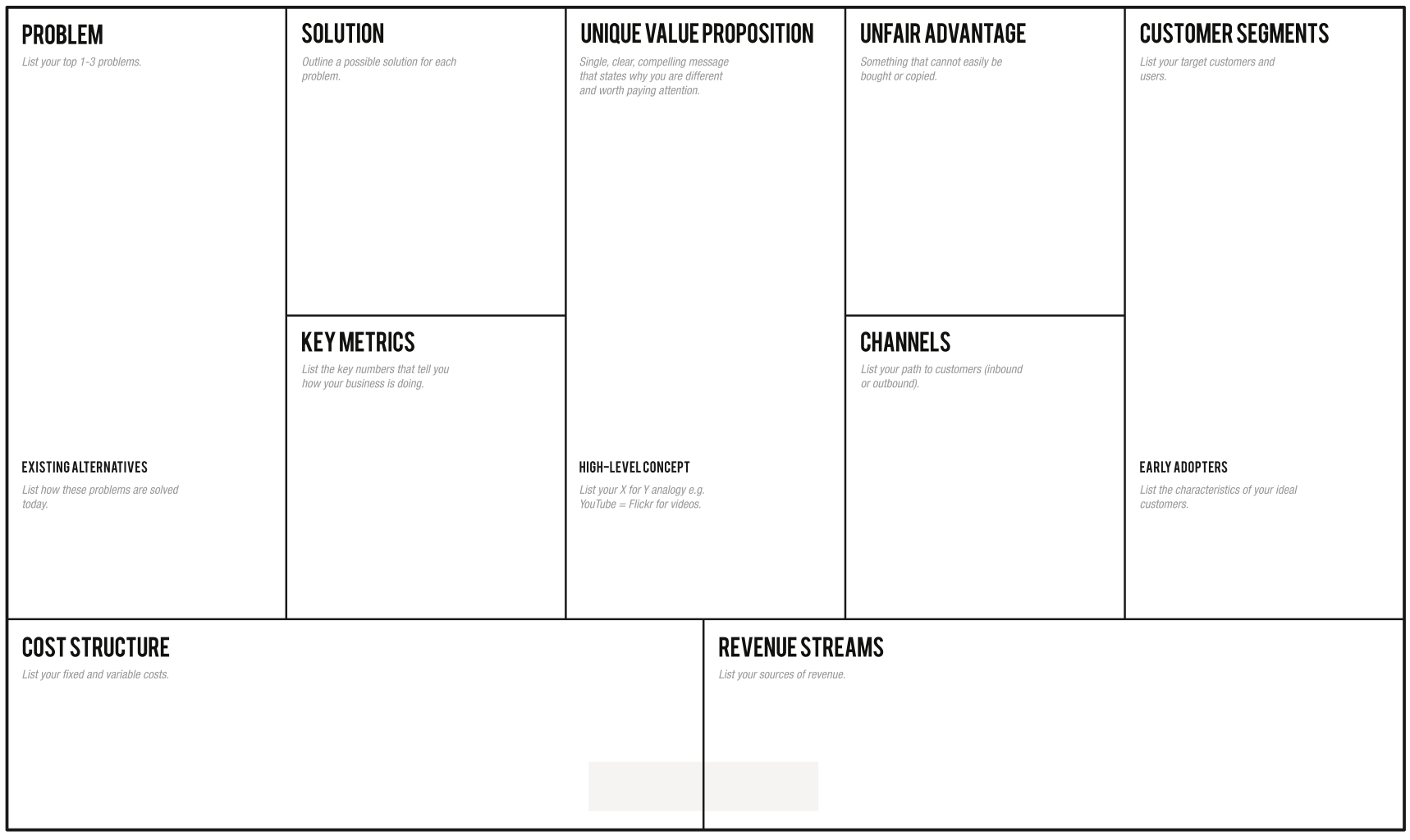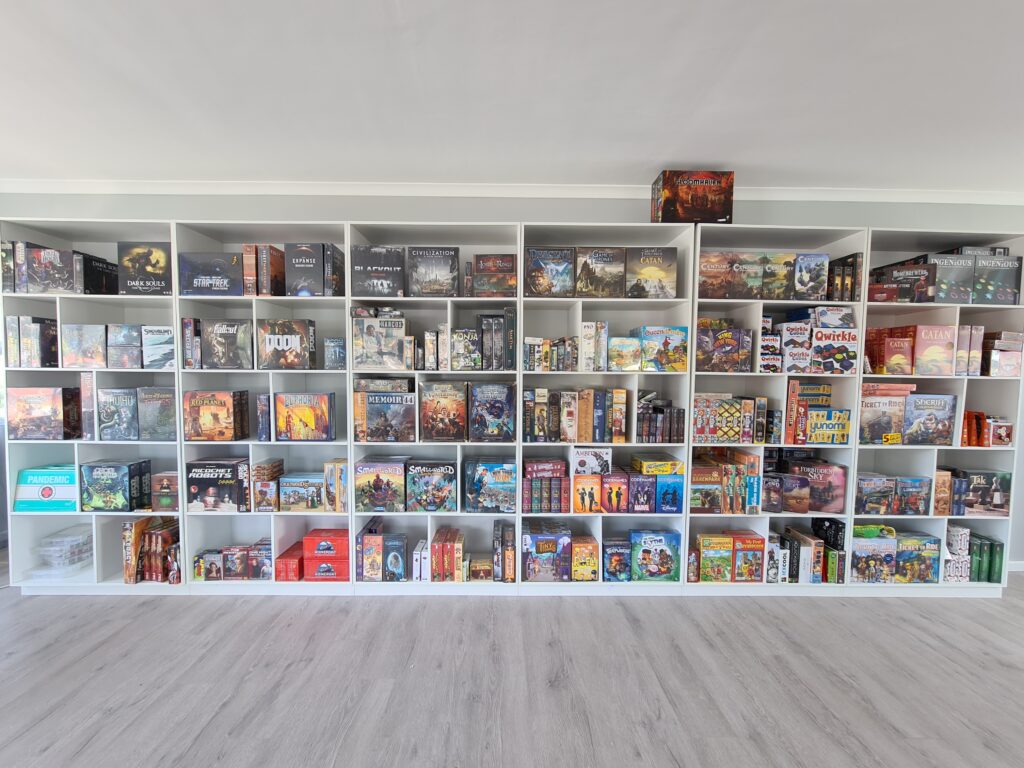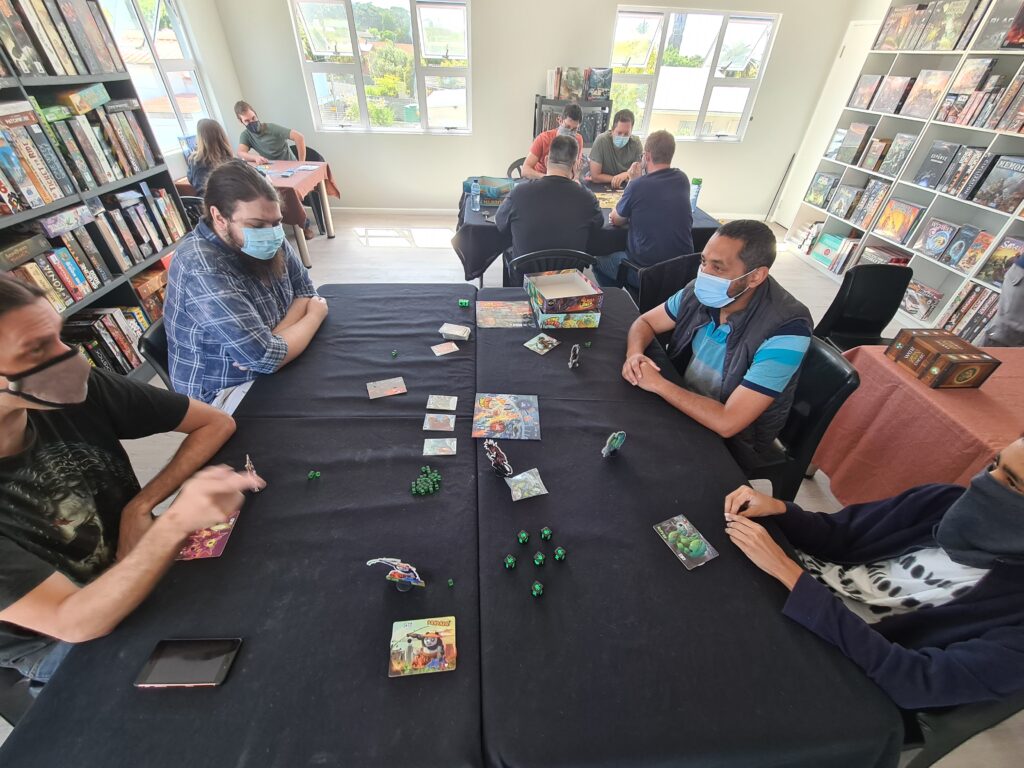How To Start A Board Game Store – Money & Cardboard…

Board game store you say?
My name is Zach. I’ve owned and operated Fanaticus Board Games for about a decade. We started out as a traditional hobby shop selling train sets and model kits. Within the first year it became clear that the board games were outselling the traditional hobbies at an astronomical rate, so we pivoted towards board games specifically. I really can’t give you a magic formula on how to start a board game store. All I can do is explain what worked for me and what worked for colleagues that operate in the same industry. I’m not the expert on any of this, but I do have some experience I can share to cut through the nonsense.
Where we used to focus specifically on in-person advice and sales, COVID-19 has pushed us to open an online store where we try to provide the same level of interaction and personal advice that we’ve cultivated over the years. I was very resistant to the idea of going online, as it diluted the raison d’être of the business. Unfortunately at the same time we had customers calling on a daily basis that couldn’t come to the shop in person, so it was time for a change.
Where to begin
Normally I would be answering the question of how to open a physical store, but considering the amount of crazy we have going on at the moment, my first advice would actually be to start online. If it works, great. Go bigger. If it doesn’t, sell off your remaining stock at cost and close down the site. It only costs your time, and hopefully no money.
Board game store business plan – don’t just wing it
So here’s the rub: Very few businesses succeed simply from jumping in and doing a thing. It’s easy to see these success stories on the news and YouTube. Business magazines are quick to tell the story of a small home business that made it big overnight. In reality, this happens one time out of thousands and it takes an extraordinary amount of luck to make it that way.
We all have great ideas all the time. If we didn’t, nothing creative would ever happen. The question is whether that idea stands up to scrutiny. A tool I’ve used often to quickly “stress test” an idea is the Lean Canvas.

The best would be to print it out as big as your local print shop can do, then grab some colored markers and start writing. If that’s not possible, the online version is probably fine. All it really is, is a bunch of blocks with headings. There’s some quick reading involved in what exactly each block is for, but once you start filling them in it’ll become obvious.
It lets you quickly break down the idea into its constituent parts, see what’s missing, what needs attention, and in some cases, you realize that actually there’s a gaping hole in the middle of my great idea that I simply didn’t see through the rose-tinted glasses of my shower thought. What makes your business unique? What challenges are you likely to face and how do you cope with them? Are there even customers for what you’re offering‽
I’m not saying don’t do it, but be realistic with your expectations of “this is going to be great!”, before you become financially committed to something that won’t pay off.
Don’t quit your day job
Building a business isn’t an overnight thing. You will need to support yourself through the bulk of it.
“Someone’s sitting in the shade today because someone planted a tree a long time ago.”
Warren Buffett
In this case you would want to be the one planting the tree so you can sit under it later. Start small, build your way up. The fact that more of us work from home these days, means your time is more flexible. This helps a lot with running a “side hustle” before scaling it up. The barrier to entry is lower, the risk is smaller.
Board game store online – lowest barrier to entry
For a very long time, I resisted the urge to start an online board game store. The industry is very competitive and the margins are very small. You will make very little on each sale and customers will always complain about shipping options being too expensive. Even then, the big guns will beat your price every time. You need to provide market differentiation. There needs to be something you can offer that the wholesale guys can’t (or won’t) do.
In our case it was about specializing our offerings so we could provide better service. More on this later.
Stock on hand
An important decision you will need to make is on-demand stock versus held stock. Stock on demand is when you order an item from your supplier when the order is placed with you. The risk is lower because you don’t have to pay for it beforehand and hope that it will sell, however, the turnaround time will be longer, and the cost price can be unpredictable. Today I can order 10 items together and pay to ship once, tomorrow I have to pay that same shipping on only one item. There’s a careful trade-off between how much something sells for and how long a customer is willing to wait for it to arrive.
The held stock has the problem that you need to pay for it up-front and you need to store it somewhere, but when a customer places an order you can put it in a box and ship it. You also don’t have to worry about a customer accidentally ordering something that you can’t get anymore. Having to contact a customer to tell them “sorry we can’t get it” can lead to a bad impression or worse, a bad review online, turning away other potential customers.
How to open a local board game store – now it’s getting serious
When I started Fanaticus, my goal was to create a space that primarily exists to play games. This required physical space. It places us firmly in the “Friendly Local Game Store” moniker, which has its own challenges. With an online board game store running from your home, if you don’t make a sale there are hopefully no expenses. With a physical store, however, even if we make no turnover in a month we have to pay rent.
From this point onwards we’ll be talking about held stock, as you can’t have a physical store without stuff on the shelves. Some distributors will offer consignment stock, but that comes with its own risks that are a bit beyond the scope of this article. For now, if you want something in your board game store you will have to pay for it.
The advantage of having a physical board game store, especially one that’s in a well-trafficked area, is that your held stock becomes an attractor. Basically, you have your storage space pulling double duty to pull customers. Make it look nice. There are entire training seminars about how to stock shelves and when to move stuff and what should go where. A lot of it plays on the psychology of your customers. More than anything, just make it look nice.

Make it count
I can’t overstate the importance of proper bookkeeping in this regard. If it feels overwhelming, try looking for software that can help you out. Exporting the information in a format compatible with your local tax authority is even better, but just getting a proper balance sheet at the end of the month will definitely help to keep things in perspective. If you’re still overwhelmed, it might be worth the investment to sign up with a bookkeeping company. Whichever of these options you go with, it helps to have a basic grasp of retail costing. This might seem obvious to some, but it’s better to read something you already knew than not know something this vital. Nevertheless, here are a few concepts to keep in mind:
Quick real talk
As of writing this article $1.00 is approximately worth R14.00.
Cost of sale
- Cost of Sale is the money you had to spend to be able to sell this item. Hypothetically if I ordered 6 copies of a game and they cost R100 each, but I had to pay R120 to ship them to me before the sale, then the R120 shipping fee can be divided between the 6 copies. That means their cost of sale is actually R120 each, not R100. Keep this in mind when deciding on selling prices. Don’t simply copy the prices you see online. A sale is not always a sale if you’re bringing in less than you spend.
- Don’t touch the cost of sale. In my experience, this is where most businesses fall apart. When I sell a game for R1000 but I paid R700 to order that game in the first place, don’t consider that R700 to be part of your income. It’s turnover, it’s not profit. What you should do is spend that R700 on restocking, either replacing the sold copy if it’s a popular title or ordering something different to broaden your offerings. Your total held stock should never go down over time. People can’t buy the stuff you don’t have.
Indirect costs
- Indirect Costs are things that you need to pay, but it doesn’t have anything to do with the products you’re selling. Hosting, rent, storage space, paid ads on social media. These are all things that bring you sales but they don’t make money themselves. A good way to think about it is the mixed costing paradigm: When you sell a product, a portion of the money you make from that sale needs to contribute towards paying the bills. These “contributions” need to add up to the indirect costs within a certain number of trading days. If there’s money left over that’s fine, but you need to hit that target every month, no exception. Cashflow, cashflow, cashflow.
Got to spend money to make money
The initial shopfitting costs a lot and it’s something you would want to spend good money on to get it right. The first impression when someone walks in is worth almost as much as the quality of the products you sell.
“If you look after your staff, they’ll look after your customers. It’s that simple”
Richard Branson
In the beginning it’ll probably only be one of two people manning the store, but it is very important that these people (probably you included) are not only friendly and inviting to customers, but also need to know what they’re talking about and be able to explain well. There’s a difference between telling someone why a game is fun and explaining how to play it. Your average customer only wants to know what it’s about or “why is this fun”. Only when they express interest in a specific game will they care about the intricacies of the gameplay.
Do you know what you’re talking about?
I firmly believe it’s impossible to show the awesomeness of board games if you’re not a board gamer yourself. This is the differentiation I was talking about. You’ll be spending a lot of time playing games. If you can’t play them, watch someone play it, either in person or “actual play” videos. Failing that, watch or read reviews so you at least have a passing knowledge of the games you’re selling. If it’s on your shelves (either virtually or IRL) you need to know what you’re talking about. Offer advice. Encourage customers to ask questions and do your best to answer them.
Above all else, don’t be a gatekeeper. Don’t shun someone because they enjoy Risk or Monopoly. We don’t have time to be holier than thou. Show them the games you offer and encourage them to try something new. We already know how amazing this hobby is, but the general public has only seen these games on the odd episode of Big Bang Theory and that was to serve as a punchline not to exemplify the game.
Board game stores near me – they’re not the enemy
There’s a pretty good chance that you won’t be the first person in your neighborhood to open a shop like this. Have respect for others in your industry, even if your brilliant idea is going to disrupt their business in the long run.
In the case of board games, a useful trick is to try to sell products that the other board game stores in your area don’t stock. In our case, Fanaticus specializes in “box copy” games. These are games you can take out of the cupboard, set up, play, and pack away. They might have expansions but they generally don’t have a meta and they generally don’t have tournament play involved. Other stores nearby have their own niches. One store specializes in trading card games like Magic the Gathering, Yu Gi Oh, and Pokémon. Another store has large tables catering towards tabletop warfare games such as Warhammer 40K, Corvus Belli Infinity, or Star Wars Legion.
My name is Bob
If possible, establish a relationship with the owners of other similar board game stores. Even if it’s just introducing yourself, other store owners are an invaluable resource. What works in the next city over might not work in your city. If you’re going to be a friendly local board game store, it’s important to fit what works locally and the best way to do this is by being friendly. It’s better to learn by proxy than making the same mistakes others have made. That being said, don’t be afraid to try something new as long as you do your research before diving in.
You’ve got a friend in me
There’s nothing wrong with referring a customer. The industry is big enough that no single board game store can sell everything, and even less so can you or your staff stay on top of new releases. It’s more important to get potential customers playing and spending time around a table. As the industry grows, the customer base grows, and that’s good for everyone. Remember, they don’t play these games in isolation (well hopefully). They share their hobby with their friends who will become potential customers.
Buy board games
First things first: Where do I get the games to sell. Wherever you’re based, it’s almost guaranteed that there should be some sort of distributor, if not several, that cater to the products you would like to sell. When you’re starting out it helps to approach one of these resellers until you’ve established a foothold. Some of them might even offer consignment stock to fill your shelves, as long as you return the items that don’t sell.
Distributors consolidate orders from many board game stores and can place a single large order with the publishers. Often they’ve had to negotiate a trade deal with these publishers in advance to be able to offer these titles, as publishers don’t really like dealing with thousands of small orders when they can simply fulfill a few hundred massive ones. Distributors can also import items from publishers in other countries and handle all that messy business of customs clearance. The problem is that you would be beholden to the deadlines and ETA’s you receive from them. You might order a few copies of a game only to be told there’s not enough interest and shipping only a few copies isn’t feasible. This is unfortunately something that has to happen in such a niche industry as ours if we ever plan on reaching an economy of scale.
“I’m known to locate certain things from time to time.”
Red, The Shawshank Redemption
Alternatively, you can import specialty items yourself. This is high risk and can get expensive, but if your customers are informed of the risks involved and the items you’re selling are unique within the local industry, it might be worth the effort. Just don’t expect massive profits from day one.
Best board games in your board game store
Different stores specializing in different game types mean that not the same thing will sell in one board game store that sells in another, but I can recommend a few games that we consider to be “evergreen”. Of course, none of this applies to tabletop stores or trading card stores. I’m not an expert on those, but let me know if this is something you’re interested in and I’ll be happy to put you in contact with someone that would know.
- Gateway games. Board games that are easy to learn, have some mass-market presence, and are familiar to the average consumer. Catan, Carcassonne, Ticket to Ride. If it’s on your shelves it will sell. The recognizable boxes (especially the big red Catan box) are great for attracting attention and getting people in the store so you can show them other games they might like.
- “Similar but different”. This is where things come down to opinion. In our case we cater to newer gamers, coming from Risk, Monopoly, or Scrabble. So we try to stock games that are similar to these games in concept but offer something a little newer.
- Do you like Risk? Well, have you seen Dune?
- Instead of Monopoly, have you played Ticket to Ride?
- I know you like Scrabble but have you seen Qwirkle?
- More serious games. For the people that know their games or that prefer something with more depth, try to stock a few games that will interest the serious gamer. These are generally more expensive titles, so you should only stock one or two units of each. Try to cover many different play styles. It also goes to show that you’re not just in it for a quick paycheck but you’re actually interested in the hobby as a whole.
How to start a board game cafe
And now for something completely different
You’re going to need demo games.
You will need to have open copies of games available for patrons. People are going to play them, they are going to take wear and tear, they will need to be replaced. This gets expensive. Your staff will need to know the rules of the games and be able to answer questions. You will probably need some sort of method for patrons to decide what games they would like to play, book them in and out, have someone check that all the parts are there… What if someone spills a drink on a game? What’s the policy on that?
This is a massive can of worms and a completely different business model than the rest of the article. I’ll offer the advice I can regarding what I’ve seen work, but this is going to be a much bigger endeavor than simply selling games.
It’s also important to consider whether it’s a board game cafe or a cafe with board games. Is the main focus of your business the playing of the games or the consumption of the food and beverages? If it’s about the games, you can read on. If it’s about the cafe or the restaurant, then I suggest you first read up on running a successful cafe and then incorporate the board games idea as things start coming together. Pick your battles.
So about the game selection
The problem is that board games and food don’t really go together. This type of business model is risky. I usually ask what the main idea is: Are you mainly a coffee shop? Or maybe more of a restaurant or bar? That should guide your focus.
If the answer is primarily a coffee shop, then your board game offerings should be games that are quick to teach and play but can be played over several rounds. Having a small footprint on the table is also handy. Games like Zombie Dice, King of Tokyo, Love Letter, maybe Azul. Century: Spice Road can also work. Once these have gained traction and your regular customers know the games well enough that they can teach their friends, this will free up your staff to pay attention to the important thing: Serving coffee.
Grabbing coffee or grabbing a drink?
If your main focus is a board game bar, things work a little differently. People tend to linger in bars so games with a longer play time or a larger table requirement would do better. The longer they stay, the more drinks they buy. It would still be profitable to begin with games that are easier to teach, and then expand the offerings to games that require more of a learning curve. Also games for slightly larger groups. Codenames works very well in a bar-type setting. With the popularity of Among Us, games such as Werewolf, Mafia, or Spyfall also work very well. You’d want to offer something a little more gritty too, such as Game of Thrones, Caverna, Tzolk’in, maybe Roll for the Galaxy could work.
At the risk of repeating myself again another time, there are a lot of factors that play a role in this regard. What hours you’re open, where you’re located, what level of noise is tolerable, etc. All these things will influence what games do well in your specific instance. What I can say, don’t expect one part of the business to substitute the loss for another. The board games business should make its own profit and be able to replace its own damaged demo games or replenish stock. The restaurant needs to be able to pay its waiter staff and order supplies even if no board games sell. We’re looking for cross-sells not crutches.

Board game store – in summary
Starting your own business is scary but it doesn’t happen overnight. Start small, build your way up. Keep the expenses minimal for as long as you can and consider very carefully when you’re going to take the leap of faith and go full-time, but don’t let all these reservations discourage you.
If you’ve read all the way to here, either I’ve changed your mind about starting your own business or you’re quietly sitting there buzzing with excitement and ideas. If that’s you, go for it. Listen to all those ads read in the middle of your YouTube videos and go make an online shop. Start mailing distributors to open cash accounts. If you build it, they will come.
I may use affiliate links in this post. It is what helps me do this.


